When it comes to finding a suitable protein powder, the options can seem endless. Whether you’re just starting your fitness journey or looking to refine your diet, protein powder can be a helpful addition to your daily routine. However, with so many products on the market, choosing the right one for your needs can take time and effort.
This guide will walk you through critical considerations to help you make an informed decision, from understanding the types of protein powders available to determining where to buy protein powder that best suits your lifestyle.
Understanding Protein Powders
Protein powders are a convenient way to supplement your diet, particularly if you want to build muscle, recover after a workout, or ensure you get enough protein throughout the day. They come in various forms, and it’s essential to understand the differences between them before making your purchase.
Types of Protein Powders
Protein powders generally fall into two main categories: animal-based and plant-based.
Whey protein is one of the most popular animal-based options. It’s derived from milk and is known for its complete amino acid profile, which makes it an excellent choice for muscle recovery and growth. Whey protein is fast-digesting, making it ideal for post-workout consumption.
Casein protein is another milk-derived option, but it digests more slowly than whey. This slow-release of amino acids makes it great for consuming before bed or during extended periods without food.
Pea, hemp, and soy protein are just a few alternatives for those who prefer plant-based options. While these options may lack the complete amino acid profile found in animal-based proteins, they are still excellent choices for vegetarians, vegans, or individuals with dairy sensitivities. Many of these powders are also easier on the stomach and offer a more eco-friendly option.
Protein Concentrates vs. Isolates
When shopping for protein powder, you’ll likely come across the terms “concentrate” and “isolate.” These terms refer to the processing method used to create the protein powder and the resulting protein content.
Protein concentrates are less processed and contain more carbohydrates and fats than isolates. They are typically around 70-80% protein. If you’re looking for a more budget-friendly option and don’t mind a few extra grams of carbs or fats, concentrates might be the way to go.
Protein isolates, on the other hand, go through additional processing to increase their protein content, often reaching 90-95%. Isolates are usually a better choice if you’re trying to minimise fat or carbohydrate intake or have lactose sensitivity, as they typically contain little to no lactose.
Factors to Consider When Choosing Protein Powder
Before you buy protein powder, it’s essential to think about your personal goals, dietary needs, and taste preferences. Here are a few factors to keep in mind:
Your Fitness Goals
Are you trying to bulk up, lose weight, or maintain a balanced diet? Different protein powders are suited to different fitness goals. For instance, a whey protein isolate with a higher protein content might be best. On the other hand, if you’re looking to lose weight, a lower-calorie option with minimal added sugars could be better if you’re trying to build muscle.
Dietary Restrictions and Preferences
If you have dietary restrictions or sensitivities, you’ll need to select a protein powder that meets your needs. Plant-based protein powders are excellent for vegans, vegetarians, and lactose-intolerant people. If you have allergies or nutritional needs, always check the ingredient list to ensure the product fits your diet.
Taste and Texture
Let’s face it—no matter how nutritious a protein powder is, you probably won’t stick with it if it doesn’t taste good. Some powders are chalky or gritty, while others blend smoothly into shakes or smoothies. Finding the one that suits your taste buds might take trial and error.
Where to Buy Protein Powder
Now that you know what to look for in a protein powder, the next step is finding where to buy it. Fortunately, protein powder is widely available in various places, making it easy to find a product that fits your needs.
You can buy protein powder at many health food stores, supermarkets, and specialty supplement shops. Each place offers a different variety, so where you shop largely depends on your preferences and location. Some people prefer to visit physical stores to get a closer look at the products and read the labels in person. Others enjoy the convenience of buying online, where they can browse through more extensive selections and read reviews from other users.
When buying protein powder, it’s essential to compare prices and product quality. Some stores offer discounts or promotions, so it’s worth watching for deals. Also, check for hidden additives or artificial ingredients that could detract from the product’s nutritional value.
If you’re new to protein powder, purchasing a smaller container might be a good idea to ensure you like the taste and texture before committing to a giant tub.
Finding the Right Protein Powder for You
With so many options available, finding a suitable protein powder can feel overwhelming, but it doesn’t have to be. You can narrow your choices by considering your fitness goals, dietary preferences, and taste to find the perfect product. Knowing what you’re looking for will help make the process smoother.
Whether you’re shopping in person or online, the best protein powder ultimately fits your lifestyle and helps you reach your nutritional goals. Take your time, explore different products, and you’ll be well on your way to finding a protein powder that works for you.







